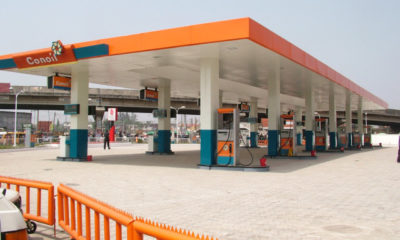Nigeria Can no Long Afford Subsidy, Says Buhari
President Muhammadu Buhari has said it is economically dangerous to go back to the era of fuel subsidy given a 60 percent decline in revenue generation.
The president, who was represented by the Vice President, Professor Yemi Osinbajo (SAN) at the opening of the First Year Ministerial Performance Review Retreat for Ministers, Permanent Secretaries and Top Government Functionaries, at the State House Conference Centre, said the plunged in global oil prices due to COVID-19 has compelled the administration to make some tough calls that may cause initial pain but necessary for long-term gains.
He said “The COVID-19 pandemic, which has affected economies globally, has compelled us to make some far-reaching adjustments that may cause some initial pain, but which is necessary for long-term gains. As you all know, when oil prices collapsed at the height of the global lockdown, we deregulated the price of premium motor spirit (PMS) such that the benefit of lower prices was passed to consumers.
“This was welcomed by all and sundry. The effect of regulation though is that PMS prices will change with changes in global oil prices. This means, quite regrettably, that as oil prices recover, we would see some increases in PMS prices.
“There are several negative consequences, if Government should resume the business of fixing or subsidizing PMS prices. First of all, it would mean a return to the costly subsidy regime. Today we have 60% less revenues; we just cannot afford the cost. The second danger is the potential return of fuel queues – which has, thankfully, become a thing of the past under this administration. Nigerians no longer have to endure long queues just to buy petrol, often at highly inflated prices.
“Also, as I hinted earlier, there is no provision for fuel subsidy in the revised 2020 budget, simply because we are not able to afford it, if reasonable provisions must be made for health, education and other social services. We now have no choice.
“Nevertheless, I want to assure our compatriots that Government will remain alert to its responsibilities. The role of government now is to prevent marketers from raising prices arbitrarily or exploiting citizens. This was why the PPRA made the announcement a few days ago setting the range of price that must not be exceeded by marketers. The advantage we now have is that anyone can bring in petroleum products and compete with marketers, that way the price of petrol will be keep coming down”, the President said.
Speaking on the implementation of service-based billing for electricity, he said the adjustment was a painful one but its necessary if the nation wants consistent and reliable power supply.
He said “The other painful adjustment that we have had to make in recent days is a review of the electricity tariff regime. If there is one thing that we have heard over and over again, it is that Nigerians want consistent and reliable power supply. So the power sector remains a critical priority for the administration.
“Protecting the poor and vulnerable, while ensuring improved service in the power sector, is also a major priority for Government. And our policies, like the social investment programmes and other socio-economic schemes to benefit Nigerians, show that we remain focused on improving the welfare of the common man.
“The recent service-based tariff adjustment by the Discos has been a source of concern for many of us. Let me say frankly that like many Nigerians I have been very unhappy about the quality of service given by the Discos. That is why we have directed that tariff adjustments be made only on the basis of guaranteed improvement in service.
“Under this new arrangement only customers who are guaranteed a minimum of 12 hours of power and above can have their tariffs adjusted. Those who get less than 12 hours supply (Band D and E Customers) will not see any tariff adjustment. The poor and under privileged who were on R1 lifeline tariffs in the old structure will be maintained on lifeline tariffs, meaning that they will experience no increase.
“Government has also taken notice of the complaints about arbitrary estimated billing. Accordingly, a mass metering program is being undertaken to provide meters for over 5 million Nigerians, largely driven by preferred procurement from local manufacturers – creating thousands of jobs in the process. NERC has also been instructed to strictly enforce the capping regulation which will ensure that unmetered customers are not charged beyond the metered customers in their neighbourhood,” he said.

 Billionaire Watch3 weeks ago
Billionaire Watch3 weeks ago
 Startups4 weeks ago
Startups4 weeks ago
 News4 weeks ago
News4 weeks ago
 News4 weeks ago
News4 weeks ago
 Bitcoin4 weeks ago
Bitcoin4 weeks ago
 Naira4 weeks ago
Naira4 weeks ago
 Forex3 weeks ago
Forex3 weeks ago
 Treasury Bills4 weeks ago
Treasury Bills4 weeks ago





















